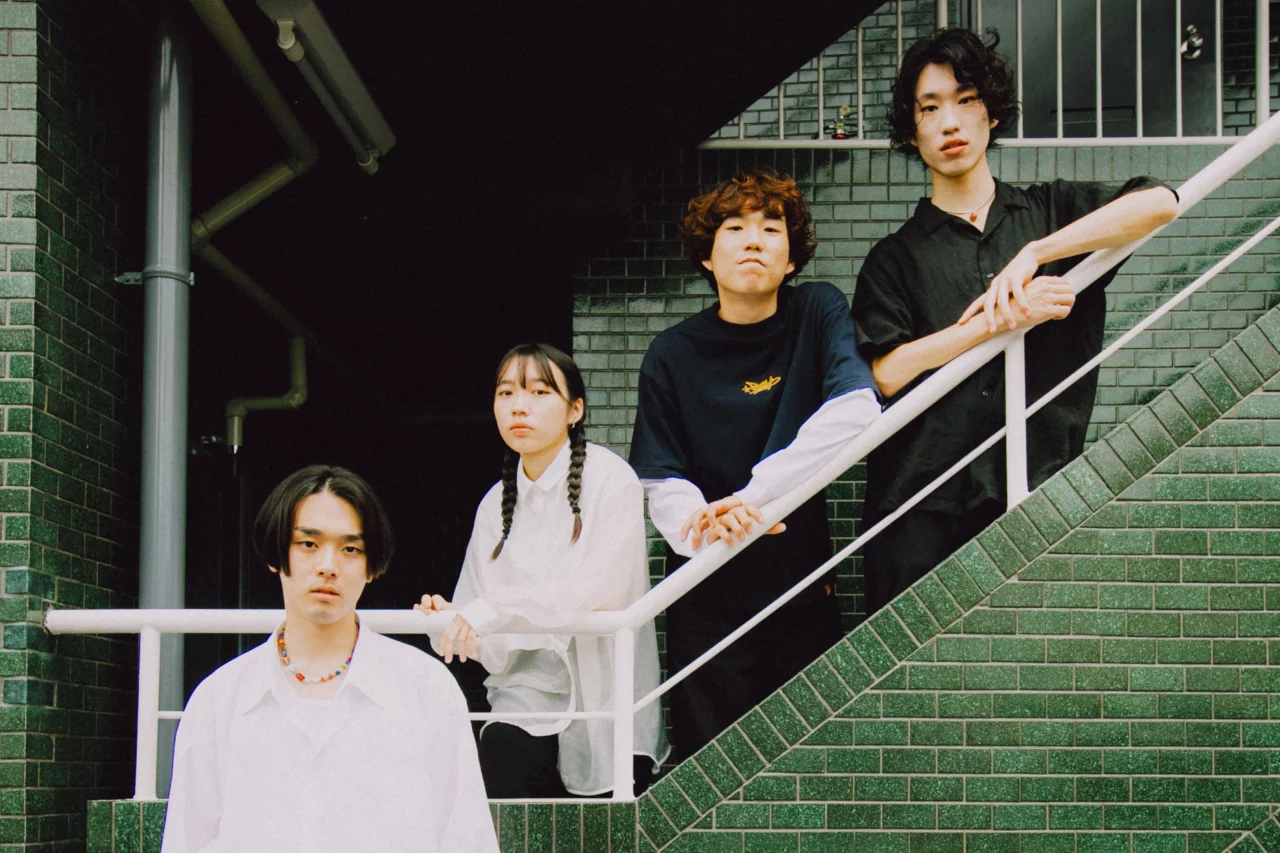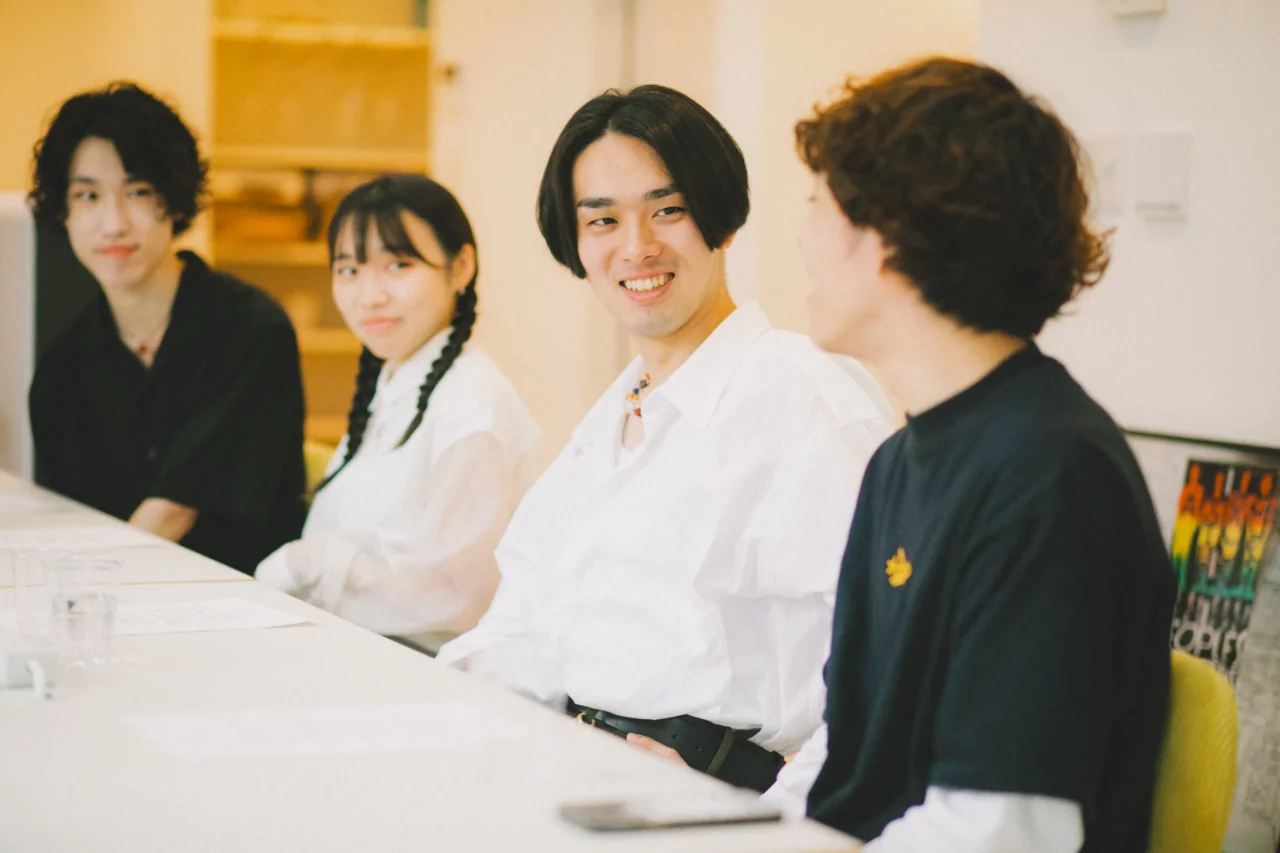In today’s world, we often make choices based on online reviews, trending music on social media, or recommendations from subscription services. With so many external opinions shaping our daily lives, how often do we truly pick something simply because we love it?
In this age of influence, one band is here to celebrate those who passionately follow their own desires. Karakoram no Yamayama, a cinema pop band formed in Tokyo in the summer of 2021, is making waves with their unique sound and bold approach.
Just two years after their formation, they’ve already played at major festivals like SUMMER SONIC and FUJI ROCK, even sharing the stage with their musical idol, Hideki Mukai. Their latest EP, *Shukan Kibatsu*, delves into the concept of “hyperreality”—a world beyond the real and unreal, inspired by YMO’s *Geijutsu*.
Lead vocalist and guitarist Sōtarō Ishida explains that this “hyperreality” is about embracing those who are fully immersed in what they love. Their surreal, captivating expression has been described as “something new and cool” by listeners, evoking the whimsy of *Doraemon* and the imaginative flair of Shinichi Hoshi. It’s a rejection of both the days when passion was cool and the cynicism of modern detachment. In this “hyperreal youth” of Generation Z, perhaps we’ll find the answer to what “coolness” will look like in the future—genuine, unapologetic, and uniquely ours.
INDEX
The Origin: An Original Song That Resonated with the Entire High School Grade
I’d like to ask Ishida, who is primarily responsible for songwriting and composition, about his project “Shibuya Session” under the name Sota Ishida, which he started before forming Karakoram no Yamayama. What inspired this project?
Ishida: In my first and second years of high school, our cover band took first place in the school festival voting, beating out the seniors. But in my third year, our female vocalist left, so we formed a ZAZEN BOYS cover band. Unfortunately, we lost to a Masaki Suda cover band. I realized that if I didn’t do something, I would graduate in second place, so I needed to figure out a way to stay on top…
So, you decided to involve as many people as possible, right?
Ishida: Exactly. I thought about how we could win and came up with the idea to gather all the musicians in my grade and create an album, which became “Shibuya Session.”
Did you feel a sense of accomplishment?
Ishida: When we released the first album Shibuya Session during the COVID-19 pandemic, everyone was at home, and suddenly, all my classmates started listening to the album at the same time. It was such a great feeling to sense that connection. Even though we were all in different places, we were all listening to the same music, and that gave me a thrill. That feeling of excitement is where it all began. Shibuya Session was a four-part series, one for each season, and the fourth album was released during the pandemic. After that, I became more focused on Karakoram no Yamayama.
Did you not pursue music until high school?
Ishida: I started playing piano at age 3, and then picked up guitar in upper elementary school. I made an EP with Ryota Ogawa and joined the brass band in high school.
So, instead of sticking to one instrument, you’ve been involved with a variety of music as a player.
Ishida: From a young age, I had a vague sense of “I’m doing music.” Because of that, I felt I had to get closer to music more than others. As a result, I ended up exploring various genres.

The music of Karakoram no Yamayama is difficult to categorize into a specific genre, as it incorporates vocals, rap, and harmonies in a technical manner. With such a diverse musical background, how did you arrive at this sound?
Ishida: Throughout my life, every time I started something, I’d find someone better than me and end up going in a different direction. I think the result of constantly avoiding people better than me is this mix of various elements. The coolness of creating a new trend with something that doesn’t exist yet was influenced by Ryuichi Sakamoto, and I have a strong desire to pursue that.
INDEX
Members: Those Who Make You Feel Like You’re on a Variety Show Together
How did Karakoram no Yamayama get started? You also recently performed with Hidetoshi Mukai from ZAZEN BOYS at your self-produced event, and in the YouTube comments, people mentioned that they were reminded of ZAZEN.
Ishida: I was deeply impressed by ZAZEN BOYS’ live performance at “Natsu no Mamono” in 2017, and that’s when I decided to form the band. Initially, I started out doing ZAZEN BOYS cover songs with Ryohta Ogawa (Key) and Gura (Dr), and then after I entered university, Yuta Kimura (Ba) joined, and that’s when things really began.

Cinemapop band based in Tokyo since the summer of 2021, consisting of Sota Ishida (Vo / Gt), Gura (Dr), Ryohta Ogawa (Key), and Yuta Kimura (Ba). On top of alternative beats, Sota Ishida’s poetry unfolds dramatically. The members, each with diverse musical backgrounds such as student big bands and jazz clubs, create beats that shift across various styles including funk, techno, and classical in each song. The catchy and original choruses stand out, adding to the band’s unique sound. Their high-energy live performances are also a must-see, with intense, musician-driven stage presence. The live shows feature complex time signatures and loop-based music, presented in a danceable form. Though each member has different musical roots, the variety of arrangements they suggest broadens the band’s creative range.
How did you come to join the band, Kimura?
Kimura: We were rehearsing in the club room for the university festival when, by chance, Sota Ishida came in to drop off his instrument. He struck up a conversation with me, and during our chat, he asked, “We’re in a band called Karakorumo no Yamayama, can you play electric bass?”
Ishida: And then you said, “I can play,” even though you had never played before!

Kimura: I did say that. At the time, I had only played the upright bass. But I wanted to try being a support player.
Did something stand out to you about Kimura when you first spoke to him, Ishida?
Ishida: When I talked to him, Kimura was watching a video of jazz drummers recovering from dropping their sticks. He said he liked the part where they smoothly return to playing after a mistake. When I heard that from him during our first meeting, I thought, “This person is different” [laughs]. I was intrigued by that side of him, so I invited him to join.
So, having something unusual about them is important for feeling like you want to make music with someone?
Ishida: I’m interested in people who make you feel like you’re on a variety show with them. When a strange person on TV says something weird, the MC never says, “This person might be different…” They start a segment to dig deeper into who that person is. I like people who make me want to delve into them like that. I want to be with people who are willing to engage in those kinds of projects or conversations. It’s not that we need a reason to talk to each other; we can just have a conversation toward a common goal outside of ourselves.
It’s like streaming a live performance without an audience. There’s no crowd, but it feels like it’s being broadcasted, and it’s not like we’re just doing it for a small group or for a big audience either.
What kind of show would you say Karakorumo no Yamayama is?
Ishida: It’s like ‘The Best Ten.’ Even though there’s no audience, there’s a sense of a glamorous space being created. The presence of cameras makes it work, but that itself is kind of strange. I think I’m drawn to the absurdity, the wastefulness, and the luxury of it all.


























